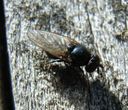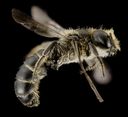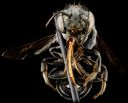Mason bees and relatives
Osmiini
Classification
- Phylum: Arthropoda
- Subphylum: Hexapoda
- Class: Insecta
- Order: Hymenoptera
- Family: Megachilidae
- Subfamily: Megachilinae
- Tribe: Osmiini
Pronunciation
How to pronounce Osmiini: /ɒˈsmiˌaɪni/
These audio files are automatically generated. While they are not always 100% accurate, they are a good starting point.
Images






Summary
Osmiini is a diverse tribe of bees comprising leafcutter, mason, and resin bees, important for pollination and found in various habitats globally except in select continents.
Physical Characteristics
Osmiini bees have conspicuous arolia, which distinguish them from other tribes like Megachile. They exhibit variation in body size and shape across different genera.
Identification Tips
Look for the presence of arolia on the feet and the morphological traits associated with specific genera. Identification may require expert examination.
Habitat
These bees occupy a range of habitats, often found in environments with abundant flowering plants, including gardens, meadows, and forests.
Distribution
Osmiini are distributed across all continents except for South America, Australia, and Antarctica. In North America, there are more than 300 species across 8 genera.
Diet
As pollinators, Osmiini primarily feed on nectar and pollen from flowering plants.
Life Cycle
Osmiini undergo complete metamorphosis, consisting of egg, larval, pupal, and adult stages.
Reproduction
Many species are solitary, with females constructing individual nests. They typically lay eggs in various substrates, including plant materials and soil.
Predators
Predators may include birds, other insects, and small mammals that consume bees or their larvae.
Ecosystem Role
Osmiini play a crucial role in pollination, contributing to the health and reproduction of various plant species.
Economic Impact
Some species are beneficial for agriculture as pollinators of crops and wild plants, enhancing yields.
Collecting Methods
- Net collection during flight
- Nesting site sampling
- Trap nesting techniques
Preservation Methods
- Drying specimens
- Preserving in ethanol
- Pinning for display purposes
Evolution
The tribe Osmiini is part of the family Megachilidae and has diversified into various genera, adapting to different ecological niches and floral resources.
Similar Taxa
- Megachilinae
- Meliponini
- Anthophorini
Misconceptions
Some may confuse Osmiini with other bee groups, assuming they behave similarly despite their distinct nesting habits.
Tags
- Osmiini
- Mason bees
- Megachilidae
- Pollinators
- Beekeeping